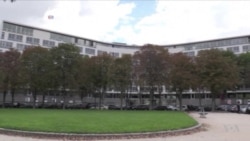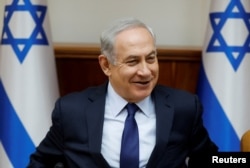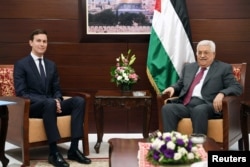State Department officials on Thursday defended the U.S. decision to withdraw from UNESCO, citing the need to see real reform at the United Nations cultural agency.
"We would like to see the politics kept out of it," State Department spokesperson Heather Nauert told reporters. "And we see with this anti-Israeli bias that is long documented on the part of UNESCO, that that needs to come to an end."
WATCH: US, Israel Withdraw from UNESCO
UNESCO, the U.N. Education, Scientific, and Cultural Organization, responded with regret over the decision.
The U.S. had stopped funding the organization after it voted to include Palestine as a member in 2011. Israeli Prime Minister Benjamin Netanyahu on Thursday thanked the United States, calling the move a "brave and moral choice, because UNESCO has become the theater of the absurd, where instead of preserving history, it is distorted.''
A UNESCO resolution earlier this year labeled the ancient holy city of Hebron as a Palestinian heritage site, a move that some Israeli officials condemned, saying it erased Israeli and Jewish history.
Netanyahu announced Israel would join the U.S. in withdrawing from UNESCO.
Hamas-Fatah reconciliation
The Israeli leader also reacted to news the Palestinian factions of Hamas and Fatah reached a reconciliation agreement Thursday during talks in Egypt.
"There is nothing we want more than peace with all our neighbors. Reconciliation between Fatah and Hamas makes peace much harder to achieve," Netanyahu said.
In Washington, State Department spokesperson Nauert said the U.S. "would welcome the effort" as a first step for the Palestinian Authority to fully assume responsibilities in Gaza.
"We see that as potentially an important step into getting humanitarian aid in to the people who live there. We are going to watch those developments very closely," Nauert added.
The head of the PLO General Delegation to the United States, Ambassador Husam Zomlot, hailed the agreement Thursday and thanked U.S. President Donald Trump and his administration for "encouraging the return of the legitimate central government to the Gaza Strip, as stipulated by the reconciliation agreement."
"The agreement is a historic and crucial step in the direction of achieving peace in the Middle East," Zomlot said in a statement.
Israeli-Palestinian peace progress under Trump?
The reconciliation between Palestinian factions comes as both Israeli and Palestinian leaders have expressed hope Trump and his top advisers are preparing a major Israeli-Palestinian peace plan that could be unveiled within weeks.
The U.S. president has repeatedly said he thinks there is a good chance an "ultimate deal" could finally happen, and has put his son-in-law, Jared Kushner, in charge of reviving the process.
Trump has acknowledged it will not be easy but told reporters at the United Nations in September, "We are giving it an absolute go — there is a good chance it could happen."
Earlier this month, Zomlot briefed reporters in Washington. He said Trump has assured Palestinian President Mahmoud Abbas that he will put his heart and soul into achieving peace in the Middle East.
Zomlot said he came away from the meetings with Trump at the U.N. with a sense of renewed hope and inspiration. Netanyahu also praised Trump at the U.N., saying his position has been "strong" and "full of clarity and conviction."
Administration mum on details
But Middle East experts are cautious, expressing skepticism that an "ultimate deal" peace agreement is within reach.
Aaron David Miller of the Wilson Center has advised both Republican and Democratic secretaries of state on the Israeli-Palestinian issue.
"If the goal is the ultimate deal, it will not be achieved," Miller told VOA.
Asked if he knows anything about a Trump peace plan, Miller said the administration has been absolutely quiet about it.
"They have succeeded in maintaining a degree of radio silence on what it is they plan to do, which is unprecedented frankly," he said. "That either means they have something truly serious or they don't have anything at all. I have given up guessing on this matter."
Israelis, Palestinians not optimistic
Natan Sachs, director of the Center for Middle East Policy at the Brookings Institution, said neither the Israeli nor the Palestinian side is optimistic this effort will lead to peace.
"Pessimism among both parties in the leadership and the public is long-standing and very deep. But there certainly is engagement from both parties," Sachs said. "Both parties are eager to engage with the administration and are hoping to shape the contours of what the administration puts forward."
The Brookings analyst says the plan being pushed forward is reportedly an interim deal, not necessarily a final status agreement. He says the plan may enlarge Palestinian sovereignty within the West Bank and, perhaps, promote reconciliation between the Palestinian Authority and Hamas in Gaza.
Israel-based Shalom Lipner, also with the Brookings Institution, says that during the 2016 U.S. presidential campaign, Republicans and their allies on the Israeli right promoted Trump as an "antidote" to the rancor between former President Barack Obama and Netanyahu.
But Lipner, who served seven consecutive Israeli premiers, said so far not much has changed.
"Trump has thus far offered little — beyond rhetoric and symbolism — in the way of a policy shift with regard to areas of concern to Israel," he noted. "Contradictory statements by administration officials on issues like the future of the Iran nuclear deal and White House aspirations to close the ultimate deal between Israel and the Palestinians are the source of great confusion about Trump's intentions."








